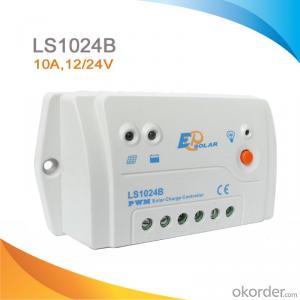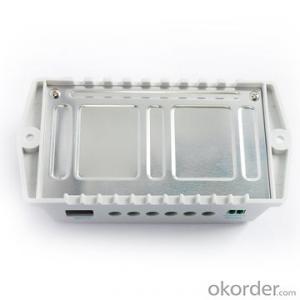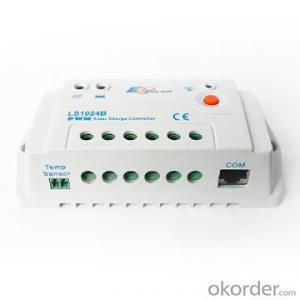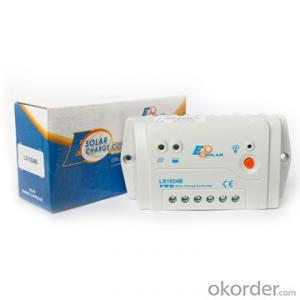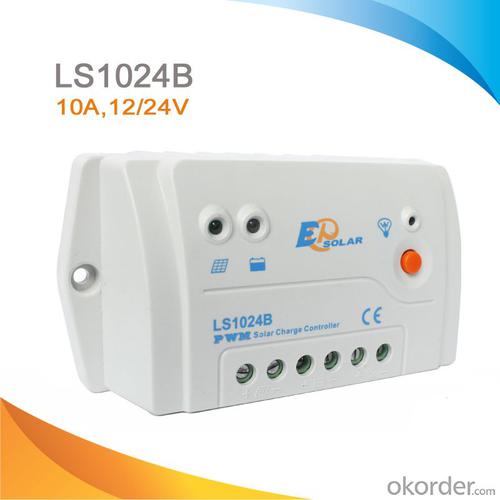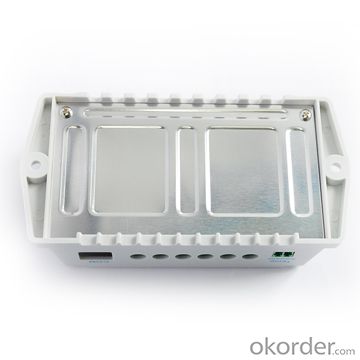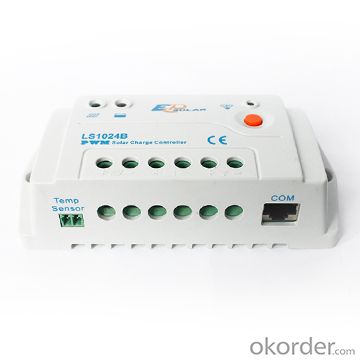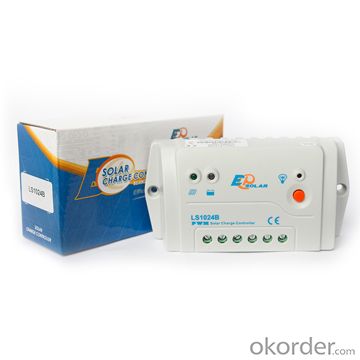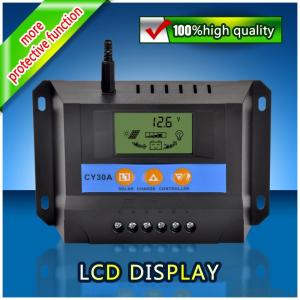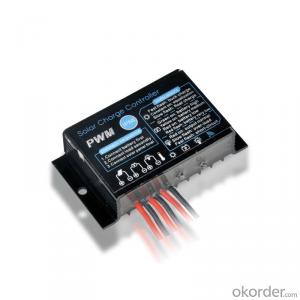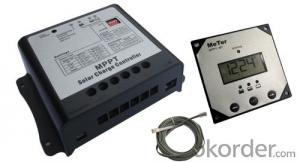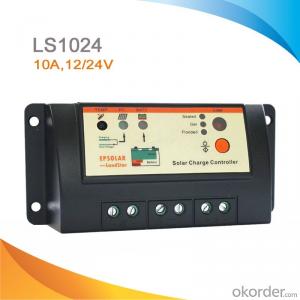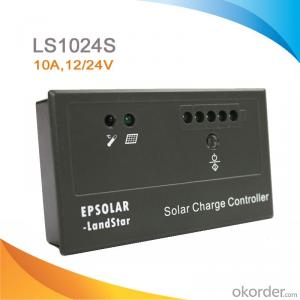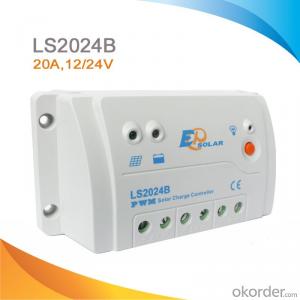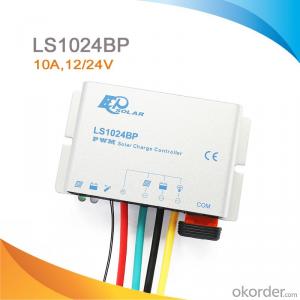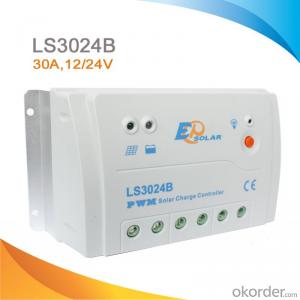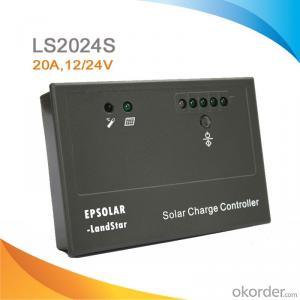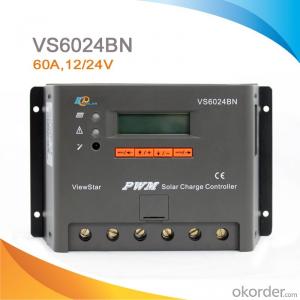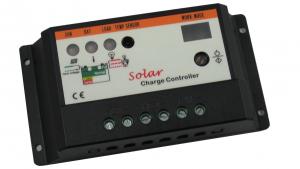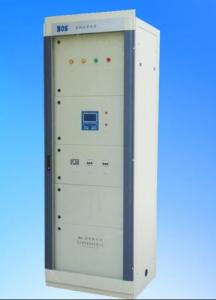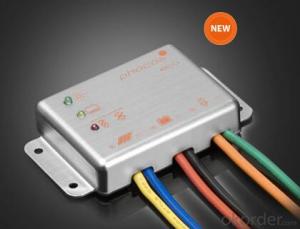PWM Solar Panel Charge Controller, 10A 12/24V, LS1024B - Solar Light Controllers
- Loading Port:
- Tianjin
- Payment Terms:
- TT or LC
- Min Order Qty:
- 100 pc
- Supply Capability:
- 10000 pc/month
OKorder Service Pledge
OKorder Financial Service
You Might Also Like
PWM Solar Panel Charge Controller (10A 12/24V, LS1024B)
Product Description:
Three system voltage configuration : 12V, 24V or 12V/24V auto work
High efficiency PWM charging with temperature compensation
3 LEDs shows PV charging, battery and load status
External temperature sensor interface
RS-485 bus communication
Open standard Modbus communication protocol
Software update function
Powerful function via MT50 or PC
Diversified load control modes : Manual, Light ON/OFF, Light ON+ Timer, Time Control
Battery type selection: Gel, sealed, flooded and User type
Real-time monitor
Programmable parameters
LVD or SOC load disconnect function
Energy statistics function
Main Product Features:
PV short circuit
PV reverse polarity
Battery overcharge
Battery over discharge
Battery reverse polarity
Load short circuit
Load overload
Overheating
Specifications of PWM Solar Panel Charge Controller,10A 12/24V,LS1024B:
Minimum Order Quantity: | pc | Unit: | pc | Loading Port: | Tianjin |
Supply Ability: | 10000 pc/month | Payment Terms: | TT or LC | Package: | Paper Packaging |
Electrical parameters | LS1024B | LS2024B | LS3024B | ||
Nominal System Voltage | 12 / 24V auto work | ||||
Rated Battery Current | 10A | 20A | 30A | ||
Maximum battery voltage | 50V | ||||
Grounding | Common positive | ||||
Self-consumption | 8.4mA(12V),7.8mA(24V) | ||||
Temp. compensation | -3mV/℃/2V(25℃ ref) | ||||
Equalize charging voltage | Sealed: 14.6V, Flooded: 14.8V, User-defined: 9~17V | ||||
Boost charging voltage | Gel: 14.2V, Sealed: 14.4V, Flooded: 14.6V, User-defined: 9~17V | ||||
Float charging voltage | Gel /Sealed /Flooded: 13.8V, User-defined: 9~17V | ||||
Low voltage reconnect voltage | Gel /Sealed /Flooded: 12.6V, User-defined: 9~17V | ||||
Low voltage disconnect voltage | Gel /Sealed /Flooded: 11.1V, User-defined: 9~17V | ||||
Working temp. | -35℃~+55℃ | ||||
Humidity | ≤95% (NC) | ||||
Enclosure | IP30 | ||||
Dimension | 138.6x69.3x37mm | 159.6x81.4x47.8mm | 200.6x101.3x57mm | ||
Terminal | 4mm2 | 10mm2 | 10mm2 | ||
Net weight | 0.13kg | 0.3kg | 0.5kg | ||
Images of PWM Solar Panel Charge Controller,10A 12/24V,LS1024B:
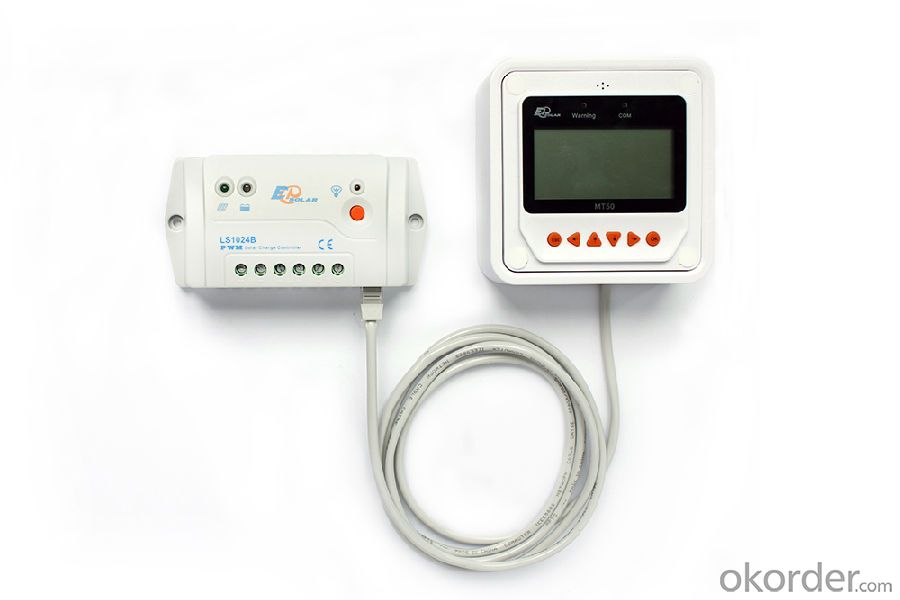
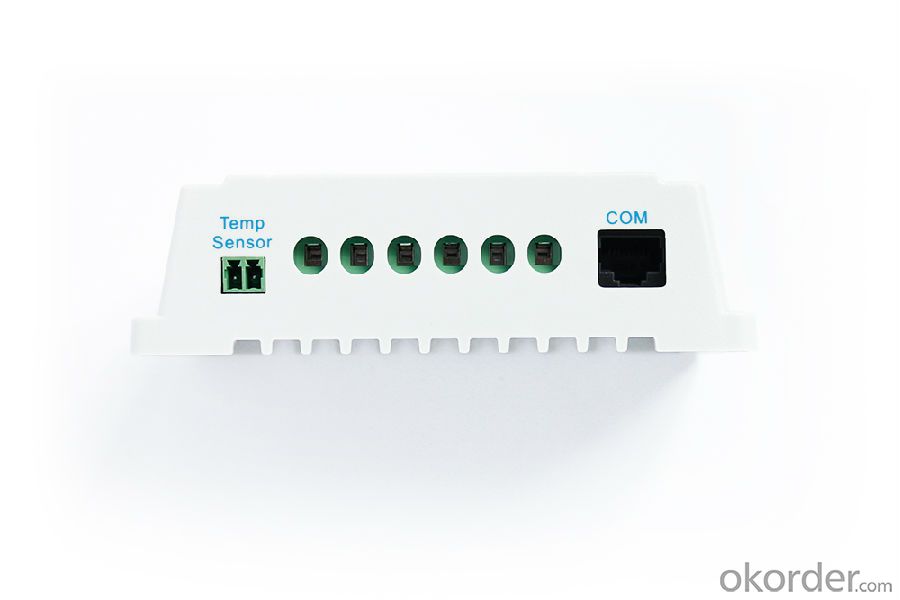
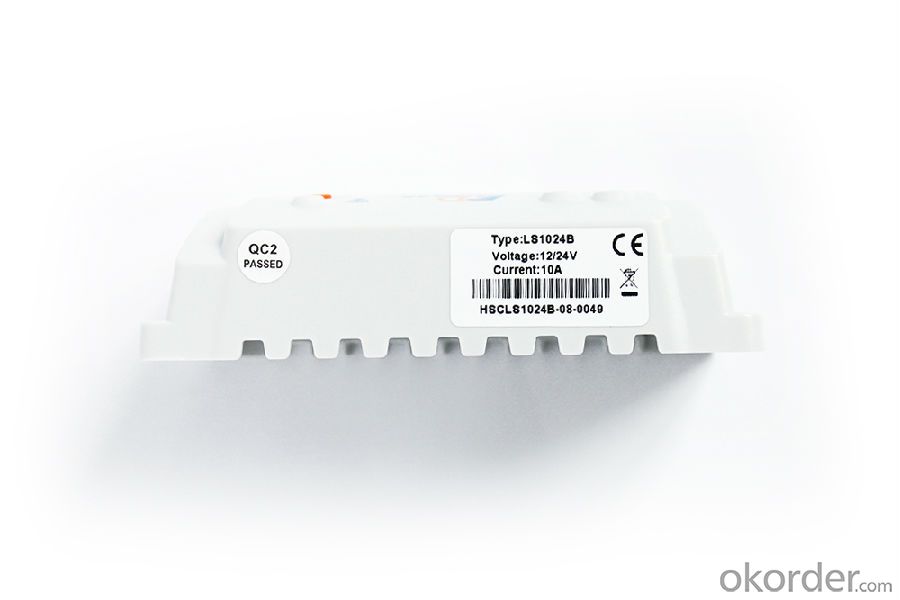
FAQ:
Q1. What is the voltage?
A1. Our 45/60A solar charge controller is 12/24/36/48V auto work.
Q2. What is the difference between MPPT&PWM?
A2. MPPT has higher efficiency; it can track the max power point and won't waste energy.
Q3. What is the efficiency of the MPPT controllers?
A3. MPPT > 99%, peak conversion efficiency > 98%.
Q4. What is the warranty of the product?
A4. 12 months
Q5. What protection does your MPPT controller have?
A5. PV array short circuit, PV reverse polarity, Battery reverse polarity, Over charging, Output short circuit.
- Q: How do you protect a solar controller from extreme weather conditions?
- To protect a solar controller from extreme weather conditions, it is recommended to install it in an enclosure or protective case that is waterproof, dustproof, and resistant to temperature fluctuations. Additionally, proper insulation and sealing of all cable connections can help prevent any damage from moisture or debris. Regular maintenance and inspection are also essential to ensure the controller's functionality and to address any potential issues promptly.
- Q: What is the role of a solar controller in preventing battery freezing?
- The role of a solar controller in preventing battery freezing is crucial. A solar controller is responsible for managing the charging process of the battery, ensuring that it is charged optimally and protected from potential damage. In cold temperatures, batteries are at risk of freezing, which can lead to irreversible damage or even render the battery useless. A solar controller helps prevent battery freezing by monitoring the temperature and voltage levels of the battery. It regulates the charging process to ensure that the battery is not overcharged, as overcharging can generate excessive heat and increase the risk of freezing. Additionally, the solar controller may include a temperature sensor that detects low temperatures and adjusts the charging voltage accordingly. By reducing the charging voltage, the solar controller prevents the battery from freezing while still maintaining a sufficient level of charge. Furthermore, some advanced solar controllers offer additional features to prevent battery freezing. These features may include temperature compensation, which adjusts the charging voltage based on the battery's temperature, ensuring optimal charging even in extreme conditions. Additionally, some controllers may provide a low-temperature disconnect function, which automatically disconnects the battery from the solar panel when the temperature drops below a certain threshold, preventing freezing and potential damage. In summary, the role of a solar controller in preventing battery freezing is to regulate the charging process, monitor temperature and voltage levels, and adjust the charging voltage based on the battery's temperature. This ensures that the battery remains protected and operational even in cold weather conditions.
- Q: Do solar controllers require regular maintenance?
- Yes, solar controllers do require regular maintenance. This typically involves checking the connections, cleaning any debris or dust, inspecting the wiring, and ensuring proper functioning of the controller. Regular maintenance helps to optimize performance and prolong the lifespan of the solar controller.
- Q: Are solar controllers weatherproof?
- Solar controllers are known for being weatherproof. They are built to endure outdoor conditions such as rain, snow, extreme temperatures, and various weather elements. Their construction incorporates sturdy materials, and many come with an IP (Ingress Protection) rating, which signifies their safeguarding level against dust and water. However, it is crucial to verify the particular product specifications and IP rating of a solar controller to guarantee its suitability for the intended outdoor usage.
- Q: Can a solar controller be used with solar panels that are connected to a charge controller?
- Yes, a solar controller can be used with solar panels that are connected to a charge controller. The solar controller monitors and regulates the charging process of the batteries connected to the charge controller, ensuring optimal performance and preventing overcharging or discharging. It enhances the efficiency and longevity of the solar panel system by managing the flow of energy from the solar panels to the batteries.
- Q: Can a solar controller be used with a solar-powered non-profit organization?
- Yes, a solar controller can definitely be used with a solar-powered non-profit organization. A solar controller is an essential component of any solar power system as it regulates the charging and discharging of batteries, ensuring efficient and safe operation. By using a solar controller, the non-profit organization can effectively manage the flow of energy from solar panels to batteries, maximizing the utilization of solar power and extending the lifespan of the batteries. This will ultimately help the organization reduce its reliance on grid electricity and contribute to its sustainability goals.
- Q: Can a solar controller be used with other renewable energy sources?
- Yes, a solar controller can be used with other renewable energy sources. Solar controllers are designed to regulate the charging and discharging of batteries in solar power systems, but they can also be used to manage the charging process of batteries in conjunction with other renewable energy sources like wind or hydro power. By integrating a solar controller into a hybrid renewable energy system, the charging process can be optimized and the batteries can be effectively utilized, increasing the overall efficiency and reliability of the system.
- Q: Can a solar controller be used with a solar-powered electric vehicle charging station?
- Yes, a solar controller can be used with a solar-powered electric vehicle charging station. The solar controller regulates and optimizes the power output from the solar panels to charge the electric vehicle's batteries efficiently. It ensures that the charging station receives the appropriate voltage and current from the solar panels, thereby maximizing the charging performance and minimizing any potential damage to the batteries.
- Q: Are all solar controllers compatible with all types of batteries?
- No, not all solar controllers are compatible with all types of batteries. Solar controllers are designed to regulate the charging and discharging of batteries in a solar power system. Different types of batteries have different voltage and charging requirements, and as a result, solar controllers need to be matched with the specific type of battery being used. There are several types of batteries commonly used in solar power systems, such as lead-acid, lithium-ion, and gel batteries. Each of these batteries has a different voltage range for charging and discharging, as well as different requirements for temperature compensation and equalization. Therefore, solar controllers need to be specifically designed to cater to these different battery types. For example, a solar controller that is designed for lead-acid batteries may have different charging algorithms and voltage settings compared to a solar controller designed for lithium-ion batteries. Using the wrong type of solar controller with a battery can lead to inefficient charging, reduced battery life, and even damage to the battery. To ensure compatibility, it is important to carefully read the specifications and recommendations provided by the solar controller manufacturer. These specifications will typically outline the compatible battery types, voltage ranges, and other important details. It is always advisable to consult with a professional or the manufacturer if there are any doubts about compatibility between a solar controller and a specific type of battery.
- Q: Which parts are broken, how to repair
- Check the circuit, if the circuit is good, then you have to get the seller to see, because you know where is bad, you no tool material, can not change.
Send your message to us
PWM Solar Panel Charge Controller, 10A 12/24V, LS1024B - Solar Light Controllers
- Loading Port:
- Tianjin
- Payment Terms:
- TT or LC
- Min Order Qty:
- 100 pc
- Supply Capability:
- 10000 pc/month
OKorder Service Pledge
OKorder Financial Service
Similar products
Hot products
Hot Searches
Related keywords
